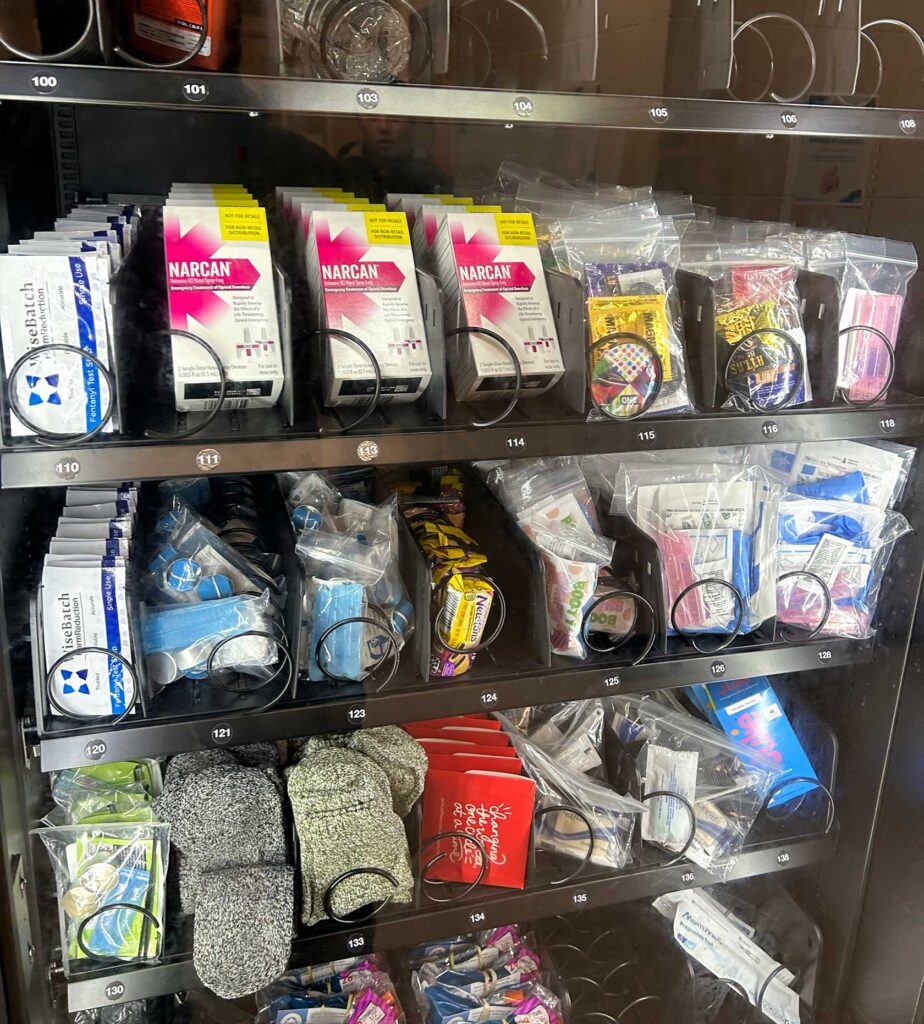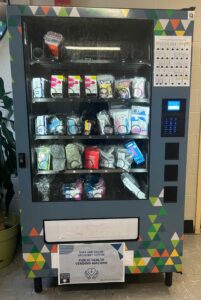
For four organizations in Boston, new vending machines won’t mean a snack to crunch on but rather access to opioid overdose-reversing medications and other harm reduction supplies.
The four vending machines are part of a statewide program to install harm reduction dispensers — 14 of them across Massachusetts — stocked with things like Narcan and naloxone, clean syringes and fentanyl test strips, as well as other public health supplies like pregnancy tests, socks and personal protective equipment, all available for free, the city announced on Dec. 23.
In Boston, the four machines were distributed by the Boston Public Health Commission to the Southampton Street Shelter near Massachusetts Avenue and Melnea Cass Boulevard, enVision Hotel Boston in Jamaica Plain, the North End Waterfront Community Health Center’s Charlestown public housing location, as well as the health commission’s recovery services office in the Finland Building at Boston Medical Center.
Dr. Bisola Ojikutu, executive director of the Boston Public Health Commission, said she sees the vending machines as a way to push back on the stigma around harm reduction tools that can help save lives.
“These vending machines and kiosks are a low-cost, compassionate way to destigmatize harm reduction and expand access throughout our city,” she said in a statement.
Recipient organizations welcomed the machines as a way to continue providing care for residents and the communities they serve.
“This work reflects our continued commitment to community health care by increasing access to life-saving supplies, inviting individuals into care, and reducing stigmatizing experiences,” said David Perry, director of substance use disorders at North End Waterfront Health, in a statement.

A new harm reduction vending machine is shown at the Boston Public Health Commission’s Recovery Services office in the Boston Medical Center Finland Building. The machine is one of four that the city received from a state effort, all of which are stocked with opioid harm reduction tools like Narcan and fentanyl test strips, along with other public health resources. PHOTO: Boston Public Health Commission
In addition to the four vending machines provided to the city through the state Department of Public Health’s Bureau of Substance Addiction Services and Office of HIV/AIDS, the Boston Public Health Commission will be working with an additional eight organizations across the city to install naloxone kiosks, repurposed newspaper stands with free access to the overdose-reversing drug.
The locations of those kiosks, which will be housed by organizations that include Bridge Over Troubled Waters, the Woods Mullen Women’s Shelter and the Suffolk County Jail and House of Correction, will be “strategically placed in reach of populations experiencing higher overdose rates,” according to the health commission.
Cyril Ubiem, senior vice president of programs and services at the Harvard Street Neighborhood Health Center — one of the organizations receiving a naloxone kiosk — said in a text that he expects the more easily accessible to the public and save lives in the community.
In an interview with the Banner, Ojikutu said efforts to increase access to harm reduction services, like these, might have led to the decrease in overdose deaths recorded in the city in the first four months of the year, compared to the same period in 2023.
Statewide in 2023, Massachusetts as a whole saw overdose deaths drop by the largest amount in a decade, according to figures released in June, but in that time Boston and the state’s populations of color didn’t see the same decreases.
“Making naloxone available can save lives and reduce the stigma associated with substance use disorders, both of which are part of our commitment to addressing the opioid crisis,” said Dr. David Wolfe, chief medical officer at Massachusetts Behavioral Health Partnership (MBHP) and manager medical director at Carelon Behavioral Health, in a statement. The eight kiosks were funded by MBHP and Carelon.
The announcement of the new access programs comes as the state, too, took steps to increase access to treatment for substance use disorder. On Dec. 23, Gov. Maura Healey signed legislation to make treatment and recovery support more affordable and accessible.
“Over the course of my career, I’ve been motivated by those who have tragically lost loved ones to the opioid crisis that is impacting all of our communities,” Healey said. “Their stories have served as important reminders of the urgent need to increase treatment, prevention and recovery services to save lives. I’m proud to sign this bill that will expand access to lifesaving overdose reversal medications and coaching throughout the recovery process.”
The legislation requires that insurance providers in Massachusetts cover opioid reversal medications like Narcan and naloxone and updates insurance requirements around non-opioid pain treatments.
The law also requires that hospitals and treatment facilities prescribe or dispense at least two doses of the medication to patients with a history of overdose, opioid use, or opioid use disorder when discharged.
And it aims to provide other support to those struggling with opioid addition. The law establishes licensure for recovery coaches — trained individuals, generally those who have a history of substance use disorder themselves — who support those facing addiction. Access to those coaches is also required to be covered by insurance under the legislation.
“The measures included in this bill will help break down barriers to care and push back against the stigma that hinders far too many from seeking effective treatment and moving toward recovery,” said Dr. Robbie Goldstein, the state public health commissioner. “Notably, this model of care affirms that the Commonwealth is committed to treating substance use disorder as a public health issue, not as a moral failing. It recognizes that with the right support, individuals can reclaim their lives, families can heal, and communities can thrive.”






